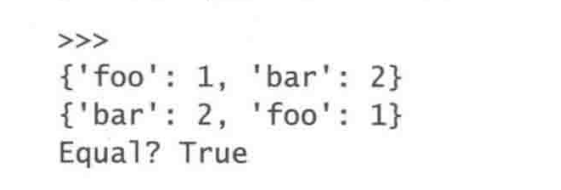1.双向队列
from collections import deque
fifo = deque()
fifo.append(1)
x = fifo.popleft()
print(x)
输出:1


 2.有序字典
2.有序字典
标准的字典是无序的,在拥有相同键值对的两个dict上迭代,可能出现不同的迭代顺序的情况,是因为快速哈希表的实现方式而导致的.
书中例子实验失败
from random import randint
a = {}
a['foo'] = 1
a['bar'] = 2
while True:
z = randint(99, 1013)
b = {}
for i in range(z):
b[i] = i
b['foo'] = 1
b['bar'] = 2
for i in range(z):
del b[i]
if str(b) != str(a):
break
print(a)
print(b)
print('Equal?', a == b)
书中期望的输出是(字典值添加顺序的显示会不同)
作者希望使用的orderdict类型
from collections import OrderedDict
第一个字典 = OrderedDict()
第一个字典['foo'] = 1
第一个字典['bar'] = 2
第二个字典 = OrderedDict()
第二个字典['foo'] = 'red'
第二个字典['bar'] = 'blue'
for v1, v2 in zip(第一个字典.values(), 第二个字典.values()):
print(v1, v2)
输出结果:
1 red
2 blue


3.带有默认值的字典
在字典中保存计数器时,必须要用稍微麻烦一点的方式,才能实现简答你的功能
stats = {}
key = 'my_counter'
if key not in stats:
stats[key] = 0
stats[key] += 1
# 下面可以实现上面的内容
from collections import defaultdict
stats = defaultdict(int)
stats['my_counter'] = 1


4.堆队列(优先级队列)
from _heapq import heappop
from heapq import heappush
a = []
heappush(a, 5)
heappush(a, 3)
heappush(a, 7)
heappush(a, 4)
print(heappop(a), heappop(a), heappop(a), heappop(a))
输出:
3 4 5 7



5.二分查找
from bisect import bisect_left
x = list(range(10**6))
import time
s = time.time()
i = x.index(991234)
print(time.time() - s)
s = time.time()
i = bisect_left(x, 991234)
print(time.time() - s)
输出:
0.006944179534912109
3.814697265625e-06


6.与迭代器相关的工具

static PyTypeObject chain_type = {
PyVarObject_HEAD_INIT(NULL, 0)
"itertools.chain", /* tp_name */
sizeof(chainobject), /* tp_basicsize */
0, /* tp_itemsize */
/* methods */
(destructor)chain_dealloc, /* tp_dealloc */
0, /* tp_print */
0, /* tp_getattr */
0, /* tp_setattr */
0, /* tp_reserved */
0, /* tp_repr */
0, /* tp_as_number */
0, /* tp_as_sequence */
0, /* tp_as_mapping */
0, /* tp_hash */
0, /* tp_call */
0, /* tp_str */
PyObject_GenericGetAttr, /* tp_getattro */
0, /* tp_setattro */
0, /* tp_as_buffer */
Py_TPFLAGS_DEFAULT | Py_TPFLAGS_HAVE_GC |
Py_TPFLAGS_BASETYPE, /* tp_flags */
chain_doc, /* tp_doc */
(traverseproc)chain_traverse, /* tp_traverse */
0, /* tp_clear */
0, /* tp_richcompare */
0, /* tp_weaklistoffset */
PyObject_SelfIter, /* tp_iter */
(iternextfunc)chain_next, /* tp_iternext */
chain_methods, /* tp_methods */
0, /* tp_members */
0, /* tp_getset */
0, /* tp_base */
0, /* tp_dict */
0, /* tp_descr_get */
0, /* tp_descr_set */
0, /* tp_dictoffset */
0, /* tp_init */
0, /* tp_alloc */
chain_new, /* tp_new */
PyObject_GC_Del, /* tp_free */
};
因为类型定义
#ifdef Py_LIMITED_API
typedef struct _typeobject PyTypeObject; /* opaque */
#else
typedef struct _typeobject {
PyObject_VAR_HEAD
const char *tp_name; /* For printing, in format "<module>.<name>" */
Py_ssize_t tp_basicsize, tp_itemsize; /* For allocation */
/* Methods to implement standard operations */
destructor tp_dealloc;
printfunc tp_print;
getattrfunc tp_getattr;
setattrfunc tp_setattr;
PyAsyncMethods *tp_as_async; /* formerly known as tp_compare (Python 2)
or tp_reserved (Python 3) */
reprfunc tp_repr;
/* Method suites for standard classes */
PyNumberMethods *tp_as_number;
PySequenceMethods *tp_as_sequence;
PyMappingMethods *tp_as_mapping;
/* More standard operations (here for binary compatibility) */
hashfunc tp_hash;
ternaryfunc tp_call;
reprfunc tp_str;
getattrofunc tp_getattro;
setattrofunc tp_setattro;
/* Functions to access object as input/output buffer */
PyBufferProcs *tp_as_buffer;
/* Flags to define presence of optional/expanded features */
unsigned long tp_flags;
const char *tp_doc; /* Documentation string */
/* Assigned meaning in release 2.0 */
/* call function for all accessible objects */
traverseproc tp_traverse;
/* delete references to contained objects */
inquiry tp_clear;
/* Assigned meaning in release 2.1 */
/* rich comparisons */
richcmpfunc tp_richcompare;
/* weak reference enabler */
Py_ssize_t tp_weaklistoffset;
/* Iterators */
getiterfunc tp_iter;
iternextfunc tp_iternext;
/* Attribute descriptor and subclassing stuff */
struct PyMethodDef *tp_methods;
struct PyMemberDef *tp_members;
struct PyGetSetDef *tp_getset;
struct _typeobject *tp_base;
PyObject *tp_dict;
descrgetfunc tp_descr_get;
descrsetfunc tp_descr_set;
Py_ssize_t tp_dictoffset;
initproc tp_init;
allocfunc tp_alloc;
newfunc tp_new;
freefunc tp_free; /* Low-level free-memory routine */
inquiry tp_is_gc; /* For PyObject_IS_GC */
PyObject *tp_bases;
PyObject *tp_mro; /* method resolution order */
PyObject *tp_cache;
PyObject *tp_subclasses;
PyObject *tp_weaklist;
destructor tp_del;
/* Type attribute cache version tag. Added in version 2.6 */
unsigned int tp_version_tag;
destructor tp_finalize;
#ifdef COUNT_ALLOCS
/* these must be last and never explicitly initialized */
Py_ssize_t tp_allocs;
Py_ssize_t tp_frees;
Py_ssize_t tp_maxalloc;
struct _typeobject *tp_prev;
struct _typeobject *tp_next;
#endif
} PyTypeObject;
#endif






















 1299
1299

 被折叠的 条评论
为什么被折叠?
被折叠的 条评论
为什么被折叠?








